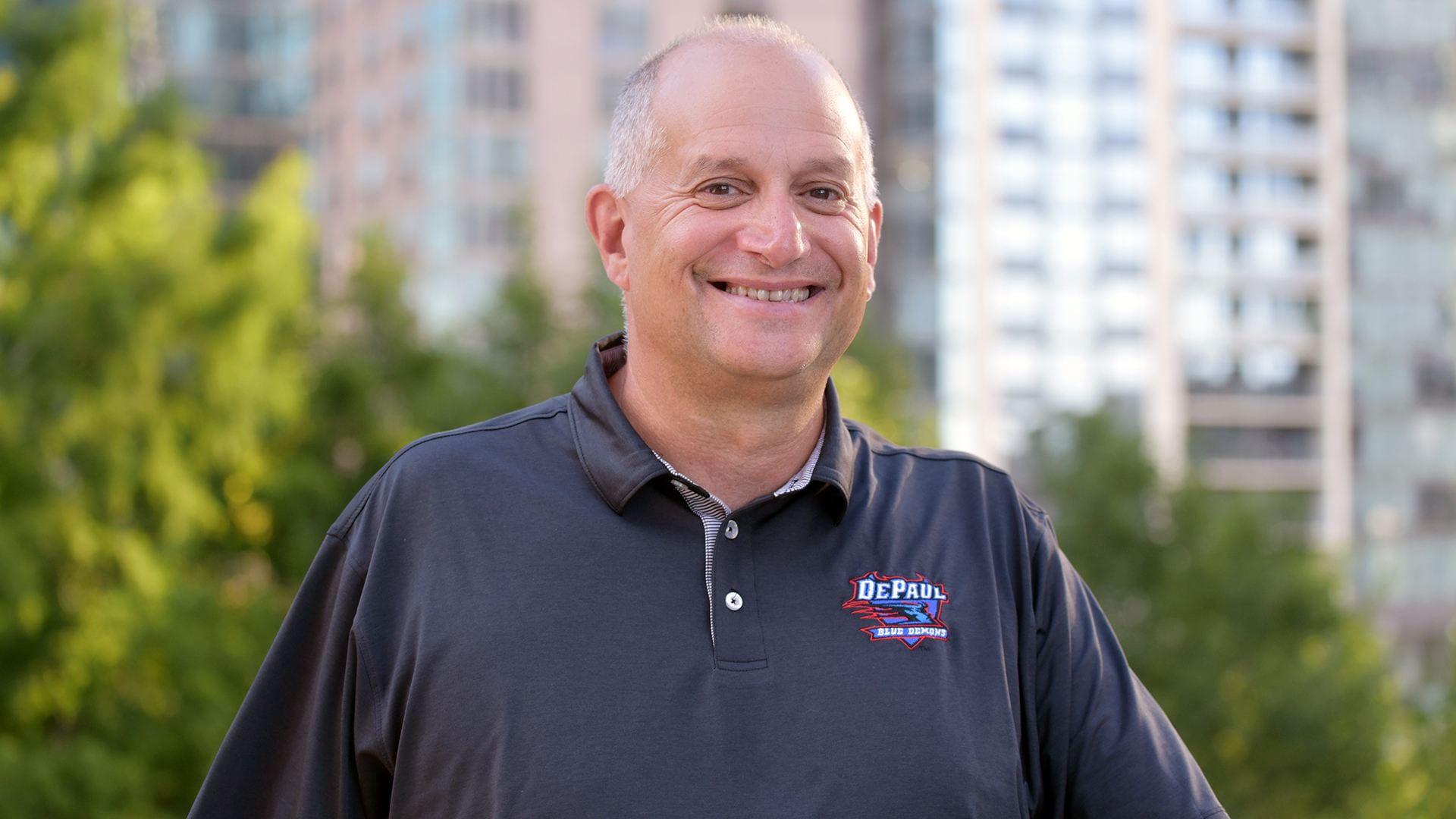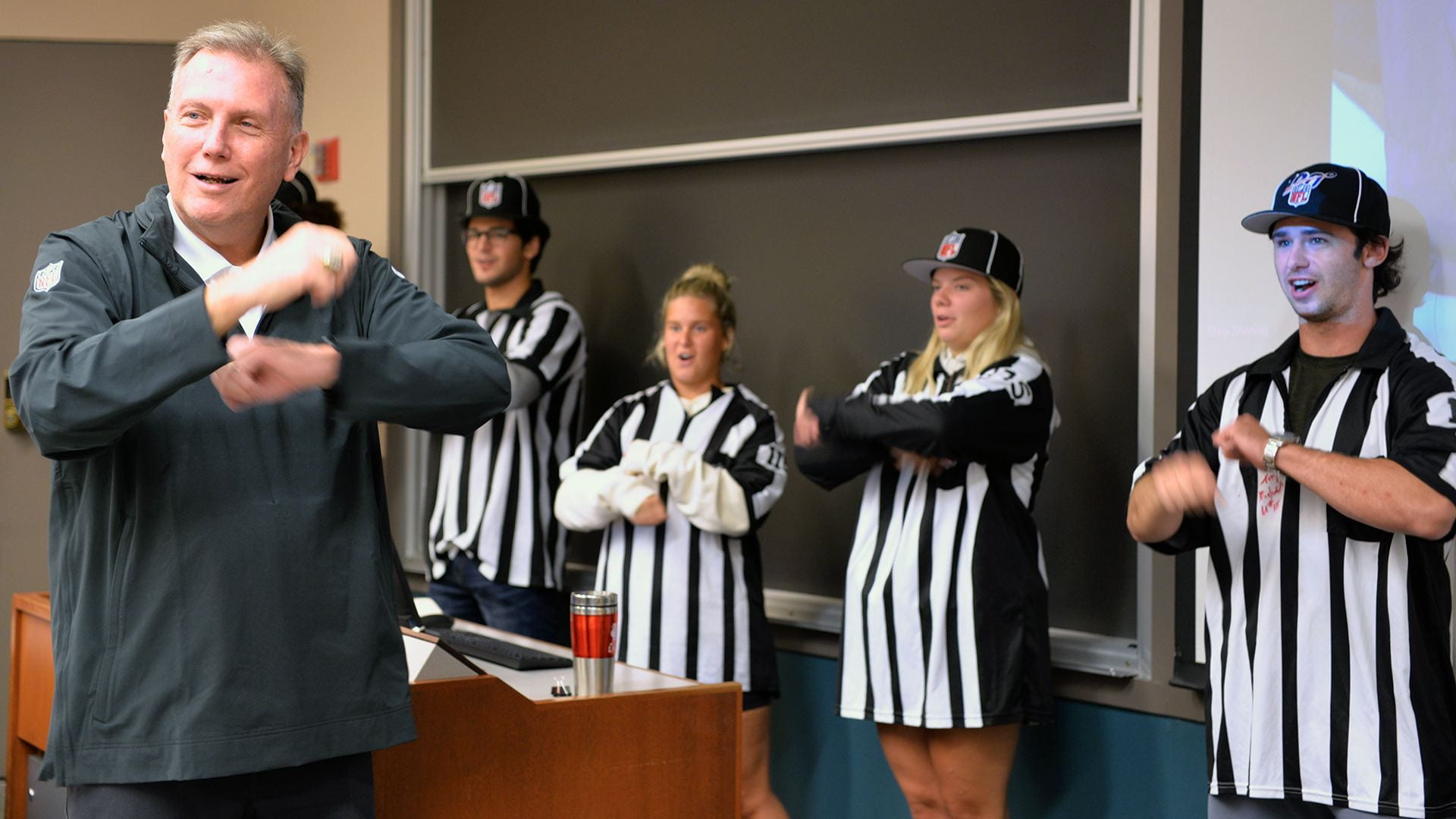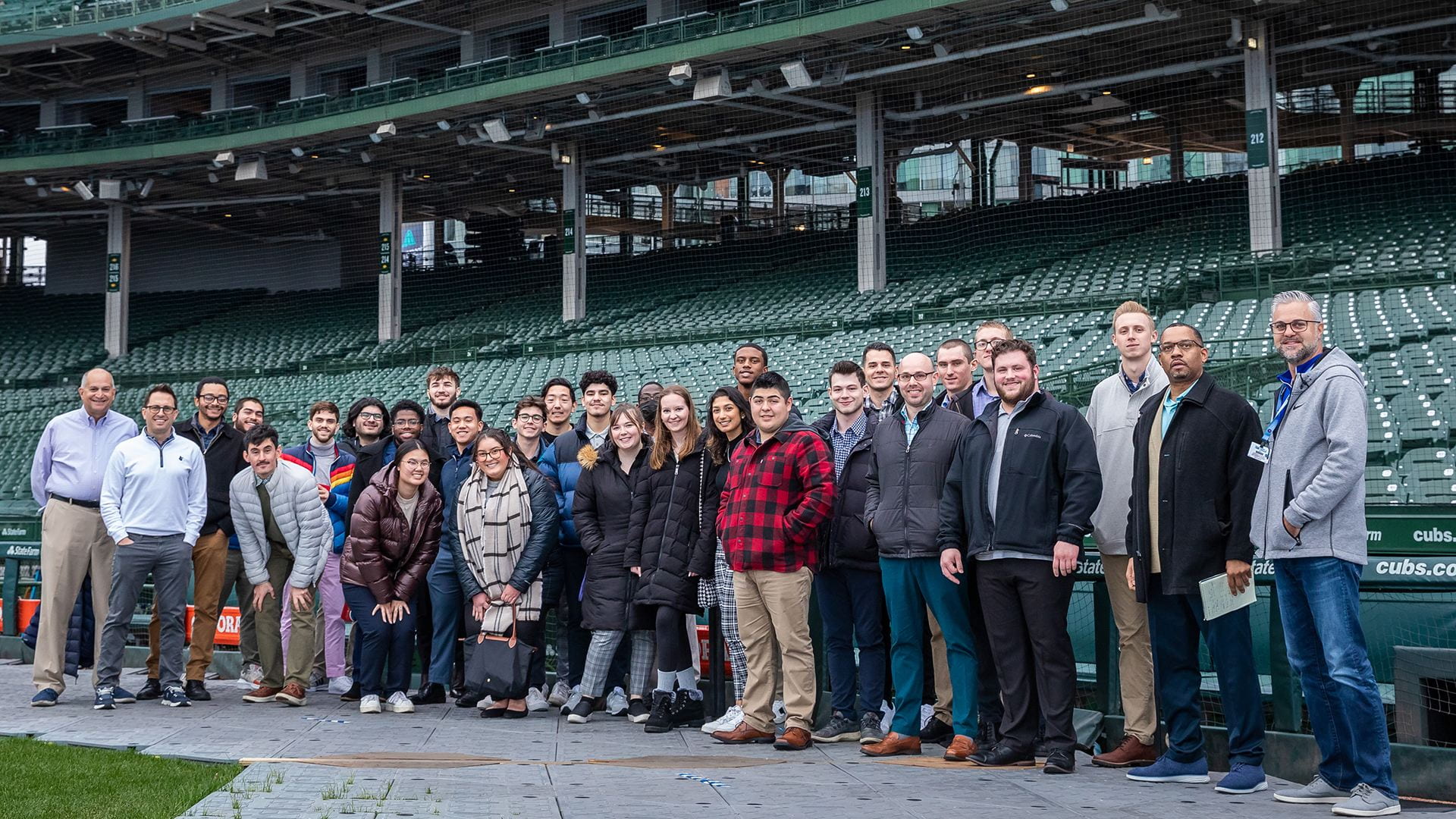
by Sulin Ba | May 27, 2025 | Notes from the Dean
Dear alumni and friends of DePaul’s Driehaus College of Business:
Welcome to the spring 2025 issue of the Business Exchange!

Dean of the Driehaus College of Business Sulin Ba converses with CTA representatives at the March 7 poster presentation
This year has been full of exciting news at Driehaus.
Our students and faculty are partnering with the CTA to imagine how entrepreneurs can revitalize communities.
They’re working with the sixth largest privately held company in America to find the insights hidden in data.
And they’re charting the hidden landscape of affordable housing in Chicago, g
iving communities valuable tools to advocate for their needs.
There are a few principles that unify these projects.
- A Driehaus education has a purpose: Guided by expert faculty, our students are jumping straight into the real world. They’re wading through complications and complexity. And they’re getting to see their ideas and insights make a real difference.
- A Driehaus education has an impact: Our students and researchers bring a fresh perspective to the challenges, large and small, that businesses face today. Our partnerships are win/win opportunities for the organizations we partner with and our students alike.
- A Driehaus education couldn’t happen anywhere else: Each of these projects originated with one of the many personal connections that knit Driehaus and Chicago together. At a time when so much about education is changing, these stories attest to the enduring value of the personal, place-based connections that make Driehaus Chicago’s business school.
In this issue, you’ll also read the stories of two alumni who are leaders in their respective fields.
- On April 10, I sat down with alumnus and CEO Julian Francis (MBA ’96) for our second Executive Speaker Series. Our conversation provided a unique window into what it’s like to lead a Fortune 500 company in a uniquely fast-paced industry – and how managing people is critical to success.
- Last fall, I was proud to hear that Jenny Ciszewski (BUS ’02) — a partner at Deloitte and the first female president of our accounting donor society Ledger & Quill — was named among the Most Influential Bay Area Women in Business. In this issue, you’ll hear how her philosophies of leadership and giving back intersect.
Both Julian and Jenny attest to the enduring impact of DePaul’s Vincentian mission. Our alumni lead not just with skill but with compassion. And they – you – are more effective leaders for it.
Sincerely,
Sulin Ba, PhD
Dean, Driehaus College of Business
DePaul University

by Meredith Carroll | May 27, 2025 | Features, Student Stories
Capstone class “challenges the status quo” of learning

When the co-directors of DePaul’s M.S. in Business Analytics program, Khadija Ali Vakeel and Sina Ansari, embarked on rethinking the program’s capstone last year, they knew they wanted it to center on a collaboration with real-world companies.
This approach promised to set students up for success in industry. But it also posed challenges. Real-world datasets are often messy. Clear answers aren’t guaranteed. Distilling insights from data is as much art as it is science, demanding storytelling skills as well as analytical savvy.
In a word, the setup for the M.S. in Business Analytics capstone “challenges the status quo” of how most classes are taught, according to Vakeel.
“Students lead their own projects,” she said. “Students pose their own questions and find their own answers, supported by the instructor and industry partners. They are discovering things. It pushes them to think about their own creativity and storytelling as well as analysis — all in a very compact time of 10 weeks.”
Students offer companies a fresh perspective
Vakeel and Ansari launched the new, hands-on version of the capstone project in spring 2024. That year, with the help of a third-party mediator, Altheon AI, the program collaborated with Skyline Design and Valqari.
In fall 2024, the program began collaborating with Reyes Holdings, a food and beverage distributor that is the sixth largest privately held company by revenue in the U.S. according to a list compiled by Forbes. That collaboration has continued ever since.
Reyes has a vast logistics network with a trove of data to match. Powered by AI, cameras in truck cabs collect virtually every kind of data imaginable. Are drivers eating or texting while they drive? Are they leaving an adequate stopping distance?
Most of all, Reyes wanted to know, how effective were its coaching programs? What could it do to make its operations safer — and bring down costs in the process?
The company had in-house experts to answer those questions. But it also needed a fresh perspective.
That’s where DePaul students came in.
“The students have so much energy,” said Vakeel. “They think outside the box. When employees of the company are looking at the same data day in and day out, they might not be able to see what a fresh perspective from students can bring in.”
The power of data — from unearthing hidden stories to driving strategy

The winning team poses with faculty and corporate partners from Reyes Holdings.
The brief for the project was intentionally open-ended. Student groups could choose which variables to look at, how to analyze them, and how to put them in context.
In capstone instructor Nidhal Bouazizi’s words, the project offered an invitation to “get a little messy with the data.”
“We were just given this dataset and the objective to enhance driver safety. There were no other real guidelines,” said Nithya Abraham, one of the students in Bouazizi’s latest winter quarter class. “That wasn’t because of our professor; that was the nature of the project. You have to play with the dataset and figure things out on your own.”
For Abraham’s class, that dataset was an intimidating file spanning over 100 columns and nearly 300,000 rows. Ongoing guidance from Bouazizi helped the student teams refine their approach. So did representatives from Reyes Holdings, who worked closely with the class throughout the term.
Some teams analyzed how factors like time and location affected risky behaviors. Others, including Abraham’s, looked at the firm’s coaching programs, comparing their effectiveness across different subsidiaries around the country.
Often, the hardest part wasn’t sifting through data fields or crafting complicated predictive models. It was figuring out how to chart a course through the data that could lead to an actionable recommendation.
In that choice lay a key lesson of the capstone project: Data is only as useful as the recommendations distilled from it.
“We could have gone and talked about a thousand things, but we stuck to focusing on preventing near-collision events to align with the cost-saving objective,” said student Alyssa Kozal. “We wanted to make a strong recommendation. And I think that made our presentation strong too.”
Or, as Bouazizi put it: “recommendations are how you monetize the data.” Recommendations — and the narratives that connect recommendations directly to the data.
Ultimately, the story of the M.S. in Business Analytics capstone project isn’t merely about students’ considerable technical expertise, or even their creativity and drive in applying it to real-world scenarios. It’s about the power of connecting statistics to strategy — and about what happens when students get the chance to think like a leader.
Kozal and her teammates, Malika Diwakar and Srushti Summanwar, were among a select few teams who got the chance to present their findings directly to executives from Reyes Holdings.
“It was important to us to have a storyline,” said Diwakar. “Who are we? What was our objective in this process? We really focused” — inspired by guidance from Bouazizi, she added — “on explaining our entire thought process, beginning to end.”
That’s part of what the capstone class gives students, said Vakeel: the ability to tell stories not just about the data, but about the process of sifting through it. The ability, in that way, to connect a company’s operations on the ground now to its strategy moving forward.
“I’m not someone who can sit at a screen for eight hours coding,” said Abraham. “What I do enjoy is looking at datasets, drawing insights from them, and making recommendations based on those insights. The capstone solidified that this is what I like doing. This is where I want to build my career.”
For students and companies alike, the capstone opens up new possibilities
Business analytics is a growing field. Bouazizi and Vakeel cite a number of students who leveraged their capstone experience to secure internships. One of Bouazizi’s students even landed a full-time role working for a manufacturer of AI-equipped cameras like the ones Reyes uses.
“This hands-on experience puts our students at a huge competitive advantage,” said Bouazizi. “We’re not providing you with a case study somebody wrote. This is the real deal.”
This spring, the program will partner with LabelMaster in addition to Reyes. That will give students the opportunity to pick a project that aligns with their career goals. It will also, Vakeel stressed, be just as beneficial for industry partners as it is for students.
“I’d say that this is a call to action to Chicago-based companies who want to partner with us,” said Vakeel. “We are open to such strategic partnerships, and we would welcome them in the future.”
“The responsibility involved in these projects is very high,” she added. “But the students have made us proud. It is a win-win situation—for DePaul, for our students, and for the companies.”
by Meredith Carroll | Nov 14, 2023 | Alumni Profiles, Faculty Focus
To take a class with Andy Clark (MBA ’87) is to get a “master class” in networking – one that launches you straight into your career.

Director of Sports Business program and Senior Instructor Andy Clark.
Andy Clark is the director of the sports business program at DePaul’s Driehaus College of Business. In 2023, he was one of two faculty selected by graduating seniors in business to win the Lawrence W. Ryan Distinguished Teaching Award at Driehaus.
When he was his students’ age, he didn’t know a career like this existed.
He recalls one moment when it all came together.
It was a basketball game: DePaul vs. Northwestern. It was the early ’80s: the height of Ray Meyer’s tenure as DePaul men’s basketball head coach. The stadium was packed: a sea of blue on one side and purple on the other, Clark recalls.
“DePaul won on a last-second shot,” Clark says. “To be there for that — to be a small part of that — was amazing.”
At the time, Clark was an intern for DePaul Athletics, after graduating from Fordham University. It was a position he’d heard about through a friend from Fordham.
“A hundred bucks a week, a room in McCabe,” he recalls of the arrangement. The flight to Chicago, he says, was his first time on a plane.
The internship gave him a glimpse into what was possible at the nexus of management, marketing and the sports world he loved so much. After his internship, he got hired as the manager of DePaul Athletics ticket sales. Eventually, he decided to earn his MBA from DePaul.
Forty years and an extensive career in sports management and marketing later, Clark has returned to where he started.
“Making relationships and keeping them”
Getting work done, Clark says, is all about “making relationships and keeping them.” This is the central message he hopes to impart to his students.

Gridiron in the Classroom: Referee Tony Michalek helps Clark’s class make the right calls.
Clark has cultivated connections with an impressive roster of guest speakers. There’s an NFL referee and an NHL player agent. There’s an Olympic silver medalist who started a nonprofit to empower girls in swimming. There are DePaul alumni, many of them Clark’s former students, hailing from every corner of the sports world.
Clark has also forged partnerships with Chicago’s top sports organizations. He’s worked especially closely with the Chicago Cubs, where a number of alumni hold posts in senior leadership. Every so often, Cubs chairman Tom Ricketts makes an appearance to speak to Clark’s students.
Clark has two criteria for each guest speaker he invites: Can they keep students — and Clark — engaged? (He “never gets bored” of site visits, he says.) And can they discuss their career in a way that imparts lessons relevant to any field, not just sports business?
“What I like about teaching,” reflects Clark, “is being a connector: connecting experts to our students, so they can learn how their skills apply to the workplace.”
In this regard, taking a class with Andy Clark is like getting a master class in networking. He schools students in crafting thoughtful, well-researched questions for speakers. He teaches them how to dress for site visits (a suit and tie are no longer required). And as part of his final exam, he tasks each student with writing thank-you notes to three guest speakers — by hand.
From classroom to career
In Clark’s courses, students aren’t only learning from the sports business world, they’re also contributing to it by partnering with leading sports organizations to carry out real-world research.

Andy Clark’s classes visit where the action all happens.
Projects for the Chicago Cubs have included an analysis of their customer service and a study on their rollout of a mobile ordering platform.
“Knowing that the work we were doing was going to be useful right away was highly motivating,” says Kenzie Mocogni (BUS ’19), who worked on the Cubs customer service study. “Working with a real client reminded us that what we are learning in the classroom at DePaul is preparing us for the business world.”
The Cubs aren’t the only team with close ties to Clark and to DePaul.
“It’s been incredibly inspiring to see DePaul students come up with innovative, impactful ideas,” says Tony Rokita, a onetime DePaul student and the former director of alumni relations for the Chicago Bulls, regarding a project that worked on a Bulls community partnership in Chicago’s West Garfield Park neighborhood.
For Clark and his students, there’s a direct line between theory and practice and between classroom and career.
“I’m not a teacher by training,” he’s quick to say. “With most of the stuff I do, no one told me I had to do it this way. For me, teaching feels like an evolution of what I was doing before [in the business field].”
As Clark reflects on teaching, he says the best part has been seeing how students’ careers unfold, outside sports as much as within it.
“It’s almost more gratifying,” he says, “when I hear from former students who don’t work in sports that they apply things from my class to their jobs now. That’s what this is all about: helping students apply what they learn.”
Teaching has taught Clark a lot, too.
“Every day,” he says, “is an education in empathy.”
—
On the first day of his Introduction to Sports Management course, Clark has one question for his students. It’s perhaps the best summary of what Clark accomplishes in his courses — and how Driehaus overall approaches preparing students for their careers.
“When do you think your career in sports is going to start?” Clark asks.
Clark’s answer? “If you’re in this class, it already started.”






